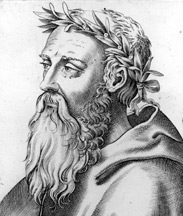Checking man’s greed for power
 In contrast to Eastern philosophers such as the Buddha and Confucius,
early Greek thinkers tried to understand the mystery of the universe.
They approached the problem in different ways. The celebrated Greek
philosopher Heraclitus concluded that the cosmos was governed by a
divine Logos. He believed that everything came into being according to
cosmic laws. Therefore, everything in the universe is held in balance. In contrast to Eastern philosophers such as the Buddha and Confucius,
early Greek thinkers tried to understand the mystery of the universe.
They approached the problem in different ways. The celebrated Greek
philosopher Heraclitus concluded that the cosmos was governed by a
divine Logos. He believed that everything came into being according to
cosmic laws. Therefore, everything in the universe is held in balance.
In fact, it is the balancing of opposites that matters. According to
him, day and night and hot and cold are opposites. While they help
maintain the balance, there is always tension between the opposites.
Good overrides the evil and vice versa. Therefore, he said everything is
in a permanent state of flux or change. Good things turn bad and bad
things turn good. Day is followed by night. Nothing remains good all the
time. Similarly, nothing remains bad all the time.
To illustrate his theory he said, “You can never step into the same
river twice.” What he meant was that the river is in constant change.
Heraclitus’ theory that everything in the universe is in a state of flux
runs counter to the views held by other Greek philosophers. Thales and
Anaximenes believed that everything has a quintessentially unchanging
essence. When he said everything is changing all the time, it is not
clear whether he believed that individual things are held together by
some energy which does not change.
Apparent permanence
|

The road up and the road down
are one and the same.
- Heraclitus (c.535-475 BCE) |
Heraclitus’ concept of change is not what we understand today. If you
study his views deeply, certain things stay the same. In other words,
many things do not change all the time. There is an “apparent
permanence” and a “hidden reality.” For instance, mountains and rivers
have an apparent permanence. They have existed from time immemorial.
However, the hidden reality is that they also change. Such changes,
however, are not visible to us because we do not live long to observe
them.
Heraclitus said the hidden reality cannot be grasped by the sense. It
can only be grasped by “seeing” or “hearing” the Logos. The unseen
design of things is more harmonious than the seen. But the harmony is
created by tension. According to him, there is a constant struggle
between opposite forces. It is similar to a stringed musical instrument.
Although the instrument appears to be at rest, there is tension in the
strings. Similarly, there is constant tension between opposite forces in
the world.
If you observe the working of any country, you will note that there
are opposing forces and pressure groups in every field of human
activity. Although we believe that such tension is unhealthy for social
harmony, Heraclitus held the opposite view. He said peace and stability
in a country exist only when there are opposing forces. On the surface,
what he said may look ludicrous, but on closer examination there is some
truth in it.
Logos
The Stoics borrowed the idea of Logos from Heraclitus. Seneca, one of
the leading Stoics said, “Events do not just happen, but arrive by
appointment.” Everything that exists is connected to the Logos. Even our
minds are sparks of fire from the Logos. According to Stoicism, we
should have implicit faith in the Logos because the universe is a divine
creation.
Christianity that came in the wake of Stoicism also professed that
everything happens as a part of God’s rational plan. If you believe in
this theory, there is no need to entertain any fear for the future nor
do we have any reason to complain about the past or present. Then all of
us can remain calm as Zeno did when all his possessions were lost in a
shipwreck.
Even the modern man has something to learn from the Stoics. Today
most of us may not believe that everything happens according to a divine
plan. But the Stoics made an intriguing claim that our best chance of
happiness is to adopt a disinterested attitude towards our own. lives.
This may promote a sense of universal amity among the people.
Christianity
Stoicism probably influenced Christianity to a great extent. While
the Stoics placed rational humanity at the centre of everything,
Christianity placed a personal God at the centre. It is believed that
Stoicism anticipated Christianity in its emphasis on the divine will.
Although there are inconsistencies in Stoicism, it is consistent with
common human experience. Humans try to control their destinies
forgetting the fact that they have no such control. Whether there is
divine plan or not, most people will always try to amass wealth or
conquer territories. No religion appears to have succeeded in
controlling man’s greed for wealth, fame and power. Therefore, at least
some of us should look at the stars while wallowing in misery.
|

